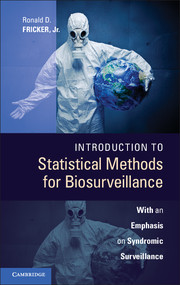Book contents
- Frontmatter
- Content
- Preface
- Acknowledgments
- Part I Introduction to Biosurveillance
- Part II Situational Awareness
- Part III Early Event Detection
- 6 Early Event Detection Design and Performance Evaluation
- 7 Univariate Temporal Methods
- 8 Multivariate Temporal and Spatio-temporal Methods
- Part IV Putting It All Together
- Part V Appendices
6 - Early Event Detection Design and Performance Evaluation
from Part III - Early Event Detection
Published online by Cambridge University Press: 05 March 2013
- Frontmatter
- Content
- Preface
- Acknowledgments
- Part I Introduction to Biosurveillance
- Part II Situational Awareness
- Part III Early Event Detection
- 6 Early Event Detection Design and Performance Evaluation
- 7 Univariate Temporal Methods
- 8 Multivariate Temporal and Spatio-temporal Methods
- Part IV Putting It All Together
- Part V Appendices
Summary
…a general challenge for all biosurveillance research is to develop improved methods for evaluating detection algorithms in light of the fact that we have little data about outbreaks of many potential diseases that are of concern.
Henry Rolka et al.(2007)Early event detection (EED) is one of the two main functions of a biosurveillance system. Per Homeland Security Presidential Directive 21 (HSPD-21), biosurveillance is “the process of active data-gathering with appropriate analysis and interpretation of biosphere data that might relate to disease activity and threats to human or animal health… in order to achieve early warning of health threats, early detection of health events, and overall situational awareness of disease activity” [emphasis added] (US Government, 2007).
This chapter opens by describing the mathematical notation and the assumptions that are used followed by a discussion of some important principles for good EED methods design. It then compares and contrasts EED to statistical methods commonly used in public health and epidemiological practice: binary classification and hypothesis testing. The chapter concludes with a discussion of EED performance metrics with a focus on a set of useful metrics and procedures for appropriately evaluating EED performance, either as part of a fielded biosurveillance system or as part of a research effort.
Information
- Type
- Chapter
- Information
- Introduction to Statistical Methods for BiosurveillanceWith an Emphasis on Syndromic Surveillance, pp. 149 - 177Publisher: Cambridge University PressPrint publication year: 2013
